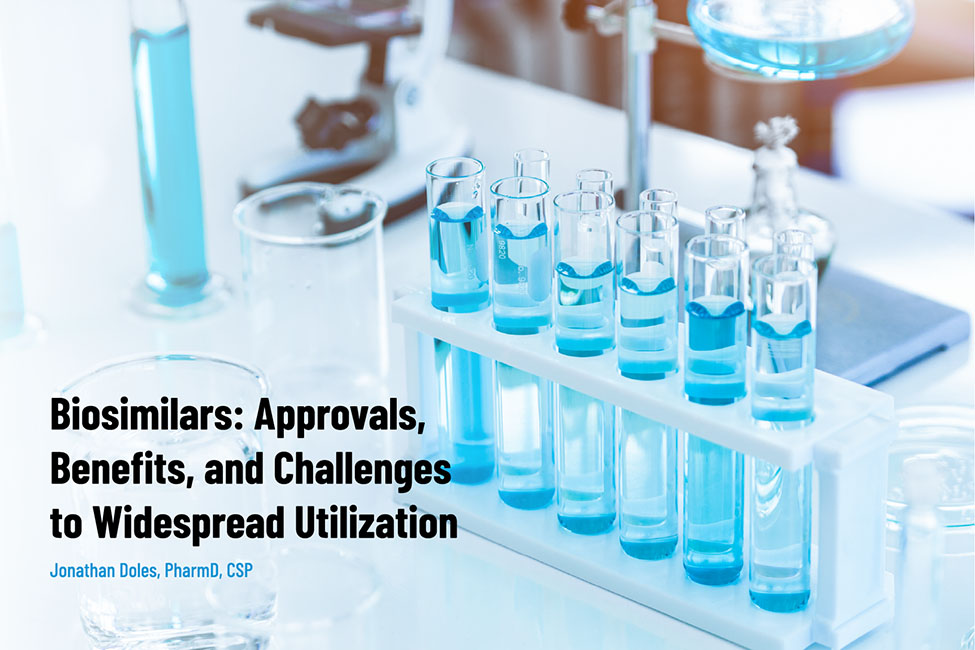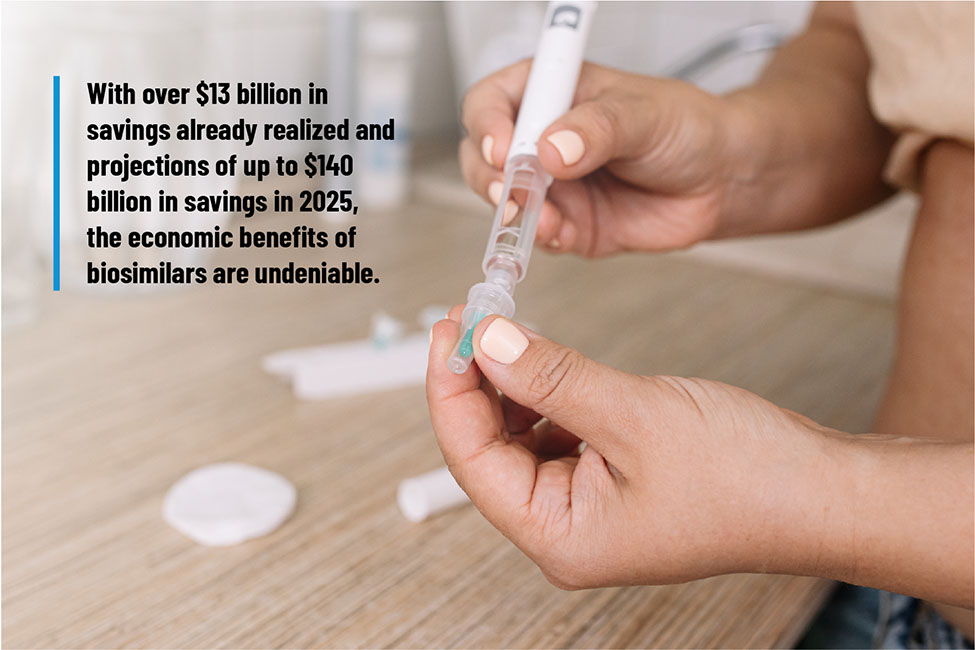Biosimilars: Approvals, Benefits, and Challenges to Widespread Utilization
March 5, 2025

The Birth of Biosimilars: A Regulatory Milestone
The FDA-approved pathway for biosimilars was established in 2009 with the passage of the Biologics Price Competition and Innovation Act (BPCI Act). This legislation introduced the Biologics License Application (BLA) process for all new biologic products and biosimilars. According to the Act, a biological product is considered biosimilar if it demonstrates high similarity to the reference product, with no clinically meaningful differences in safety, purity, or potency. Unlike small-molecule generics, which are chemically identical to their branded counterparts, biosimilars are derived from living organisms, making slight variations inevitable. Additionally, an "interchangeable" biosimilar must show that switching between it and the reference product presents no greater risk than continuing the reference product alone.1,2
A Slow Start: The First Biosimilars Approved
Despite the passage of the BPCI Act in 2009, the first biosimilar approval did not occur until 2015, when Zarxio® (filgrastim-sndz) was approved as a biosimilar for Neupogen® (filgrastim). This was followed by Inflectra® (infliximab-dyyb) in 2016, a biosimilar for Remicade® (infliximab). Since then, the market has expanded significantly, and as of February 2025, the FDA has approved 64 biosimilars across various reference products, including adalimumab, aflibercept, bevacizumab, eculizumab, and more.3
The Economic Impact of Biosimilars
Biosimilars present a significant cost-saving opportunity for the healthcare system. Between 2015 and 2021, biosimilars generated over $13 billion in savings.4 Looking ahead, estimates suggest potential savings of $38.4 to $140 billion from 2021 to 2025.5 These reductions are driven by increased biosimilar adoption, lower acquisition costs, and deeper formulary penetration. Currently, biosimilar sales prices are more than 50% lower than their branded biologic counterparts at the time of launch, and the prices of reference products have dropped by over 25% since biosimilars entered the market.6 Beyond direct cost savings, biosimilars promote competition and innovation. The introduction of biosimilars forces reference product manufacturers to reconsider pricing strategies, sometimes leading to voluntary price reductions. Additionally, greater competition in the market encourages investment in new biologic therapies, ultimately benefiting patients and healthcare providers.

Roadblocks to Biosimilar Adoption
Legal Battles and Patent Litigation
One of the primary barriers to biosimilar adoption is litigation. Patent infringement lawsuits from reference product manufacturers frequently delay biosimilar launches for years beyond FDA approval. The adalimumab litigation, for example, delayed biosimilar market entry by seven years, until 2023.7,8 Despite legal challenges, there are now nine approved adalimumab biosimilars, all set to launch by the end of 2023, with some offering price discounts of up to 90% compared to Humira®.9,10 These legal battles often involve complex patent thickets, where reference product manufacturers secure multiple patents covering various aspects of the biologic. This strategy creates significant financial and regulatory hurdles for biosimilar developers, delaying competition and prolonging market exclusivity for reference products.
The Challenge of Formulary Placement
Formulary placement plays a crucial role in determining a biosimilar's market success. Various factors influence a drug's positioning, including efficacy, overall cost, rebate agreements, and patient support programs. Although biosimilars generally offer lower acquisition costs, reference products often come with significant rebates negotiated through Pharmacy Benefit Managers (PBMs). This creates a financial balancing act between cost savings and rebate revenue.10,11 Some manufacturers have responded by offering multiple pricing options to align with payer and PBM strategies. Encouragingly, several major PBMs began adding adalimumab biosimilars to their formularies in late 2023 and early 2024, signaling a shift toward broader biosimilar adoption.12 Additionally, healthcare providers and hospital systems face logistical challenges when incorporating biosimilars into treatment plans. Medication switching protocols, electronic health record (EHR) integration, and patient education efforts require coordination and investment, further complicating biosimilar uptake.
Physician Hesitation in Prescribing Biosimilars
Physician concerns also hinder biosimilar uptake. A 2019 survey of nearly 300 specialists found that 84% opposed switching stable patients to biosimilars for non-medical reasons, citing concerns over treatment efficacy, patient mental health, and safety.13 Similarly, a 2023 survey of 1,200 physicians revealed that 77% were against non-medical switching.14 This skepticism stems from a lack of comparative efficacy studies between biosimilars and their reference products. Overcoming these concerns through education and real-world data will be crucial in increasing physician confidence and biosimilar adoption. Physician education initiatives, including continued medical education (CME) programs, peer-reviewed research, and real-world evidence studies, can help alleviate concerns and build confidence in biosimilar efficacy and safety. Additionally, regulatory agencies and professional medical associations play a crucial role in shaping physician perspectives through clear guidelines and policy recommendations.
A Promising Future for Biosimilars
Despite legal, formulary, and prescriber challenges, the biosimilar market is poised for significant growth. With over $13 billion in savings already realized and projections of up to $140 billion in savings in 2025, the economic benefits of biosimilars are undeniable.4,5 The continued expansion of biosimilars into formularies and their increasing acceptance among providers will play a critical role in driving healthcare cost reductions.
Moreover, biosimilars are expected to gain traction in therapeutic areas beyond oncology and autoimmune diseases. As regulatory frameworks evolve and manufacturing technologies advance, new biosimilars targeting conditions such as ophthalmology, endocrinology, and rare diseases will emerge, expanding access to cost-effective treatment options. The next few years will be pivotal for biosimilars, with broader adoption offering much-needed relief from rising drug costs. While obstacles remain, the trajectory is clear: biosimilars are here to stay, and their potential to transform healthcare spending is immense. Stakeholders across the healthcare ecosystem—including policymakers, providers, payers, and patients—must collaborate to foster an environment that encourages biosimilar adoption, ensuring that these cost-saving treatments reach the patients who need them most.
Unlock Cost Savings and Enhance Care with Biosimilars
- Strategic Formulary Management – We ensure biosimilars are positioned effectively to drive affordability without compromising quality.
- Optimized Cost Savings – Our data-driven approach leverages biosimilars to reduce drug spend while maintaining access to high-quality care
- Targeted Provider Engagement – We support prescriber confidence through education, real-world evidence, and clinical outreach programs
Join us in driving smarter, more cost-effective pharmacy benefits. Contact us today at info@performrx.com to explore how biosimilars can enhance your plan’s savings and member care. This blog post is a summary of an article from the Winter 2024 edition of PerformRx Review. If you enjoyed it, sign up to receive new editions and discover more content like this.
References:
- Provision of the BPCI Act. FDA. https://www.fda.gov/drugs/guidance-compliance-regulatory-information/deemed-be-license-provision-bpci-act#:~:text=The%20Biologics%20Price%20Competition%20and,biologics%20license%20application%20(BLA)%20under.
- Implementation of the BPCI Act of 2009. FDA. https://www.fda.gov/drugs/guidance-compliance-regulatory-information/implementation-biologics-price-competition-and-innovation-act-2009.
- FDA Approved Biosimilars. FDA. https://www.fda.gov/drugs/biosimilars/biosimilar-product-information.
- The U.S. Generic & Biosimilar Medicines Savings Report. Association for Accessible Medicines. https://accessiblemeds.org/sites/default/files/2022-09/AAM-2022-Generic-Biosimilar-Medicines-Savings-Report.pdf. Accessed October 2023
- Projected US Savings from Biosimilars 2021-2025. https://www.ajmc.com/view/projected-us-savings-from-biosimilars-2021-2025.
- Biosimilars in the US. IQVIA. https://www.bigmoleculewatch.com/wp-content/uploads/sites/2/2020/10/iqvia-institute-biosimilars-in-the-united-states.pdf.
- Biosimilars and biologics litigation in the United States. https://www.iam-media.com/guide/global-life-sciences/2023/article/biosimilars-and-biologics-litigation-in-the-united-states.
- AbbVie announces global resolution of Humira patient disputes with Amgen. https://news.abbvie.com/news/press-releases/abbvie-announces-global-resolution-humira-adalimumab-patent-disputes-with-amgen.htm#:~:text=Under%20the%20terms%20of%20the,in%20the%20U.S.%2C%20on%20Oct.
- Top 50 selling pharmaceuticals in 2022. Drug Discovery and Development. https://www.drugdiscoverytrends.com/50-of-2022s-best-selling-pharmaceuticals/
- Navigating Drug Formularies in Pharmacy Benefit Management. Pharmacy Times. https://www.pharmacytimes.com/view/navigating-drug-formularies-in-pharmacy-benefit-management.
- Amgen’s Humira biosimilar Amjevity hits the market with 2 different list prices. Fierce Pharma. https://www.fiercepharma.com/pharma/amgens-humira-biosimilar-amjevita-hits-market-two-different-list-prices.
- Express Scripts adds biosimilars to formulary. https://www.prnewswire.com/news-releases/express-scripts-adds-three-biosimilars-to-largest-formulary-to-promote-competition-and-advance-affordability-choices-for-patients-301872877.html. Accessed October 2023.
- Physician attitudes about non-medical switching to biosimilars: results from an online physician survey in the United States. Taylor and Francis. https://www.tandfonline.com/doi/abs/10.1080/03007995.2019.1571296?journalCode=icmo20.
- Sermo Survey – JPM Conference. https://www.sermo.com/press-releases/sermo-barometer-finds-76-of-global-physicians-would-prescribe-future-mrna-treatments-to-patients/.

Sign Up for Updates
Receive updates from PerformRx about the latest blog posts, news announcements, upcoming conferences and more.
Sign up